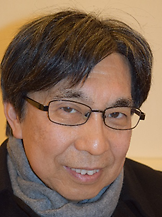A novel therapeutic strategy for osteosarcoma by inducing terminal adipocyte differentiation in chemoresistant stemlike cells

Date
Location
Description
Dear All,
Cell Signal Unit (Yamamoto Unit) would like to inform you of a seminar by Dr. Hideyuki Saya from School of Medicine, Keio University.
-----------------------------------------------------------
Date: Wednesday, February 6, 2019
Time: 13:00-14:00
Venue: C016, Level C, Lab 1
-----------------------------------------------------------
Speaker:
Dr. Hideyuki Saya, School of Medicine, Keio University
Title:
A novel therapeutic strategy for osteosarcoma by inducing terminal adipocyte differentiation in chemoresistant stemlike cells
Abstract:
Tumors comprise heterogeneous cell types, including cancer stem cells (CSCs), progenitor cells, and differentiated cells. Chemoresistance is a major issue in cancer therapy that be a potential cause of relapse and is a key characteristic of CSCs, but the development of novel therapeutic approaches for targeting these cells are limited. We previously established osteosarcoma-initiating (OSi) cells by introducing the gene for c-Myc into bone marrow stromal cells of Ink4a/Arf knockout mice. These OSi cells are composed of two distinct clones: highly tumorigenic cells (AX cells) similar to bipotent committed osteochondral progenitor cells, and tripotent cells of low tumorigenicity (AO cells) similar to mesenchymal stem cells. Here we show that depolymerization of the actin cytoskeleton suppresses tumorigenesis in chemoresistant stemlike OSi cells by inducing their terminal adipocyte differentiation. In contrast to AX cells, AO cells are highly resistant to conventional chemotherapeutic agents such as doxorubicin and thus identified as chemoresistant stemlike cells. Inhibition of Rho-kinase (ROCK) elicited terminal adipocyte differentiation in stemlike AO cells through negative regulation of the transcriptional coactivator MKL1 (megakaryoblastic leukemia 1) associated with actin depolymerization. We also found that the clinically administered ROCK inhibitor fasudil significantly suppressed the in vitro growth and in vivo tumorigenicity of stemlike AO cells and parental OSi cells. Our findings thus provide a new therapeutic strategy based on the induction of trans-terminal differentiation via modulation of actin cytoskeleton dynamics for therapy-resistant osteosarcoma stem cells.
Host:
Prof. Tadashi Yamamoto
We hope to see many of you at the seminar.
Best regards,
Yuki Nakagawa
Research Unit Administrator
Cell Signal Unit
Subscribe to the OIST Calendar: Right-click to download, then open in your calendar application.



